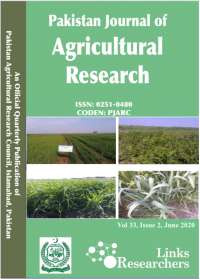Termites Onslaught in Pakistan: An In Depth Review of Agricultural Impacts
Termites Onslaught in Pakistan: An In Depth Review of Agricultural Impacts
Saddam Hussain1, Muhammad Asrar2*, Usama Saleem2, Dilbar Hussain3, Muhammad Sohail Qadir3, Muhammad Saleem3, Rashid Ali2, Zeeshan Javed2 and Mubshar Saleem4
ABSTRACT
Pakistan faces considerable losses in the field of agriculture every year as a result of termite activity. Numerous crops, particularly sugarcane, cotton, and wheat, are severely damaged by termites, resulting in substantial economic loss. Termites can potentially inflict significant agricultural losses, ranging from 20% to 45% of the harvest yield. Termites are also known to cause damage to stored food, wooden objects, household furniture, paper products, and various synthetic materials. They can attack both buried and above-ground parts of plants. They bite and chew on tubers, young and old leaves, stems, lower branches of the plants, and peanut seeds. Termite infestation is a considerable problem in the livelihood of the farmers of Pakistan. Termite swarming is a major problem and revenue constraint in the area, destroying crops in the field and store. Forests and orchards are rarely termites free, particularly when conditions are favourable for termites, such as drought. Furthermore, pasture lands used for grazing are susceptible to termites, leading to an acute shortage of animal feed. In this review, we tried to reveal all about the damages of termites in agriculture of Pakistan.
To share on other social networks, click on any share button. What are these?







